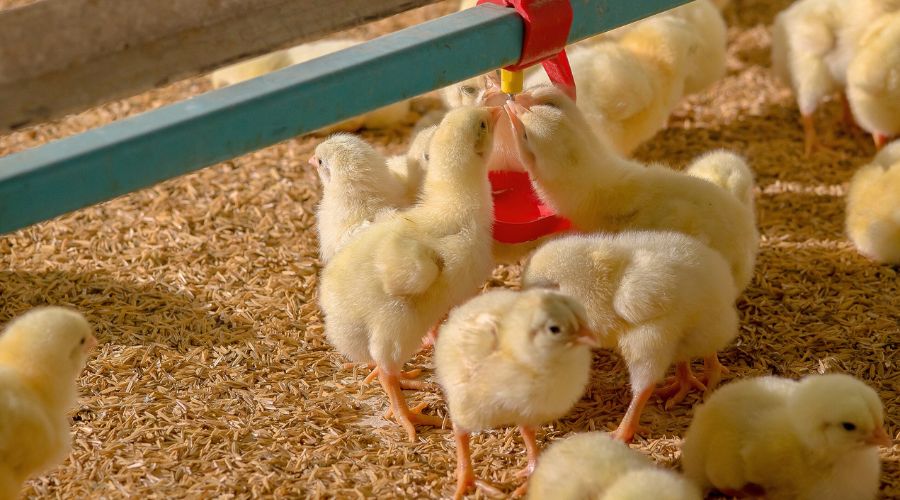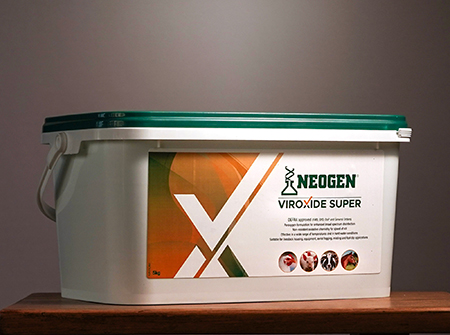Effective biosecurity helps protect flocks against new outbreaks of avian flu
18th November 2024
Neogen advises farmers that implementing a robust biosecurity programme is essential to help prevent avian influenza transmission and keep flocks safe.

Avian influenza (AI) is a significant infectious disease in both wild and domesticated birds, caused primarily by influenza type A viruses.
There are two forms of AI: highly pathogenic avian influenza (HPAI) and low pathogenic avian influenza (LPAI). Wild birds commonly function as natural carriers for these viruses, typically showing few or no symptoms, which can make containment efforts more challenging.
In September 2024, Neogen Viroxide Super was retested against H5N1 and was found to inactivate the virus in one minute at the Defra-approved dilution of 1:200.
Neogen’s team said that this rapid response time is vital for preventative controls to help limit virus spread and safeguard flock health, especially in vehicle disinfection and boot dip protocol disinfection.
Devastating disease
HPAI has a significant impact on poultry. Recently, the H5N5 strain has been confirmed in a commercial poultry flock, raising the avian influenza alert status in the UK.
Affected birds often display lethargy, severe respiratory distress, cyanosis, edema, hemorrhage, and even neurological symptoms.
Mortality in poultry from HPAI can be devastating, leading to significant losses for farmers. Due to avian influenza targeting the respiratory and intestinal tracts, oropharyngeal and cloacal swabs are essential for accurate diagnosis.
Avian influenza spreads primarily through direct contact with infected birds or exposure to their respiratory droplets and faeces.
Migratory wild birds pose a key transmission risk as they frequently travel near or over commercial poultry areas. In addition, indirect transmission can also occur through contact with contaminated materials, including feed, water, litter, equipment, and vehicles.
Even clothing and footwear can conceal the virus, emphasising the importance of strict hygiene protocols on farms.
Birds are highly susceptible to infection through inhalation or ingestion, making it essential for poultry farmers to implement biosecurity measures to minimise exposure risks.
Biosecurity measures to help AI prevention
Implementing a robust biosecurity programme is essential to help prevent avian influenza transmission and keep flocks safe, Neogen said. A biosecurity strategy should involve:
Controlled facility access: Limit access to the production area by maintaining a secure perimeter, logging visitor activity, and requiring thorough sanitation protocols. Ensuring strict entry and exit procedures, like shower-in/shower-out facilities or Danish entry systems, can help limit disease spread.
Vehicle and equipment hygiene: All vehicles and equipment entering and exiting the farm should be rigorously disinfected. Disinfecting both internal and external surfaces helps prevent pathogens from moving between locations and increasing the risk of infection.
Shed separation and cleaning: To contain potential outbreaks, treat each shed as a separate biosecurity unit. Ensure thorough disinfection of surfaces between groups of birds, proper cleaning of water lines, and water treatment to minimise contamination risks.
Wildlife and pest control: Wildlife, rodents, and insects can introduce diseases to your poultry. Limit wild birds’ access to the site, and maintain a pest control programme using rodenticides and insecticides to manage these pests effectively.
Employee education and training: Training all employees in biosecurity measures is essential. This should include training on disinfection, handling practices, and daily adherence to biosecurity protocols.
Role of Neogen’s Viroxide Super in helping to prevent avian flu
Neogen said that a well-rounded biosecurity programme is incomplete without effective disinfection.
Neogen Viroxide Super offers an effective solution with proven efficacy against H5N1, a prevalent strain of avian influenza.
The broad-spectrum powder disinfectant stands out with an in-use dilution rate 15-51% lower than comparable products tested by Defra. Neogen added that this cost-efficient product maintains biosecurity without inflating expenses.
Cost of AI and value of prevention
Beyond direct health impacts, AI outbreaks can devastate poultry farms financially. Diseases like HPAI and Newcastle disease may require mandatory culling, leading to production losses and long-term financial strain. The financial impact goes beyond immediate costs, influencing long-term productivity and profits.
With biosecurity as the first line of defence, integrating Neogen Viroxide Super as a part of your disinfection protocol strengthens your protection against AI.
By using effective practices and proven products like Neogen Viroxide Super, poultry producers can reduce AI risks and safeguard their profitability, the company confirmed.
Read more livestock news.


